Ellen Cameron, selected for prestigious fellowship, shares her research studying cyanobacteria3/19/2021 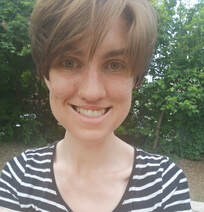 Ellen S. Cameron, PhD candidate, University of Waterloo Ellen S. Cameron, PhD candidate, University of Waterloo Ellen Cameron has been selected for the European Molecular Biology Laboratory - European Bioinformatics Institute (EMBL-EBI)-Sanger postdoctoral fellowship which combines experimental (wet-lab) and computational (dry-lab) approaches to study big data in biology. The combined approach allows researchers to have easy access to scientific expertise and well-equipped facilities to exploit complex information to make discoveries that benefit humankind. “I am excited to have been given the opportunity to be involved in the EBI-Sanger fellowship program,” shares Cameron, “EMBL-EBI and the Wellcome Trust Sanger Institute are world renowned institutions in the disciplines of bioinformatics and molecular biology. This fellowship is going to allow me to continue to build on the skills I’ve developed in graduate school and apply them in new directions.” Cameron, co-supervised by Kirsten Müller and Monica Emelko in a transdisciplinary PhD at the University of Waterloo on interpreting microbial communities of cyanobacteria using DNA analysis, will further her expertise during this fellowship. Cameron’s studies have centered on algal ecology in the past which she’ll tie into fungus symbiosis with lichens during her fellowship. She’ll be exploring an area of modern sequencing approaches in symbiosis genomics and identifying if there are key markers for interaction which could be applied to other areas of research. “Lichens are unique because they behave as miniature ecosystems with the presence of the host species, algal symbiont and other microbial organisms. Using innovative techniques, we can begin to disentangle these complex systems and explore the evolution of symbiotic relationships.” Cameron will travel to England in September 2021 where the Wellcome Genome Campus is located near Cambridge to start her fellowship. Spotlight on Ellen Cameron's research into cyanobacteria communitiesCyanobacteria blooms are a major environmental issue worldwide. They can have direct impacts on the safety of drinking water supplies by producing a variety of toxins which also impose health risks for swimmers and boaters. Although many may associate cyanobacteria with bright green algae seen on the surface of lakes, Ellen Cameron, PhD candidate in Waterloo’s Biology Department, is using DNA sequencing to study cyanobacteria communities in low-nutrient, clear lakes in Northern Ontario. “Even though the lakes I’m working in look like stereotypical picturesque lakes of Ontario, they have high abundances of cyanobacteria,” said Cameron. “We are trying to better understand the cyanobacteria communities that are in these lakes by using DNA sequencing to look for specific genetic markers that can tell us about the identity of organisms and what functions they may be performing.” Cameron is working alongside researchers in professor Monica Emelko’s forWater project. Her research sites are part of a long-term research station operated by Natural Resources Canada and Environment and Climate Change Canada in the Turkey Lakes Watershed. Cameron and her team discovered that at some of the sampling points, cyanobacteria composed 60 percent of the total microbial community. Using metagenomic shotgun sequencing, a technique that sequences all of the DNA present in the sample, Cameron and her team were able to recover three high-quality genomes for select cyanobacteria found in the lakes which contain the genetic information for these organisms. This discovery will help to understand the pathways and functions of these organisms further. “The recovery of the cyanobacteria genomes and identification of toxin genes will provide critical insight for understanding the threats that cyanobacteria impose in low-nutrient systems that may not have visible blooms,” said Cameron. 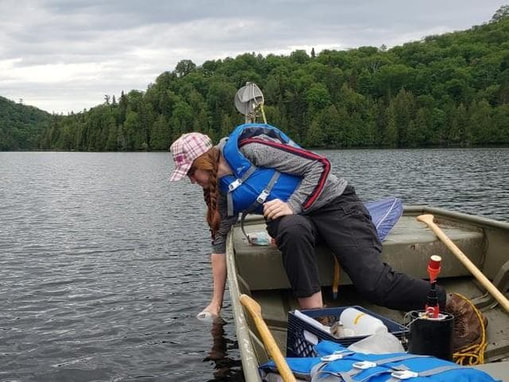 Co-supervised by Water Institute members Kirsten Müller, professor in the Department of Biology, and Monica Emelko, Canada Research Chair in Water Science, Technology & Policy and professor in the Department of Civil and Environmental Engineering, Cameron hopes that her research will improve frameworks for the design of ecologically meaningful sampling protocols for cyanobacteria monitoring. Cameron acknowledged the benefits of working in interdisciplinary teams while researching wicked water problems: “The co-supervision has allowed me to gain support from both lab groups which has been an invaluable experience and has helped provide me with insights into my data that as a biologist alone, I might not have thought of,” said Cameron.
Original research article written by Allie Dusome, Water Institute
1 Comment
Jozef
5/4/2021 04:16:56 pm
This is an amazing achievement. Congrats Ellen and everyone involved.
Reply
Leave a Reply. |
forWater NetworkThe Network provides insights into new scientific research for safe, secure drinking water---globally---which starts with resilient forests Archives
October 2023
Categories |

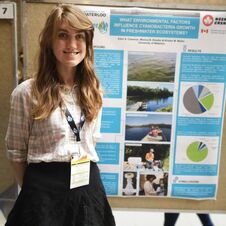
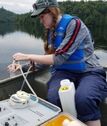
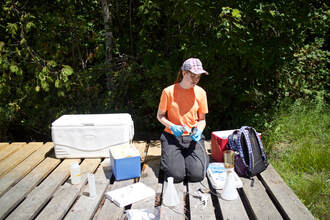
 RSS Feed
RSS Feed

